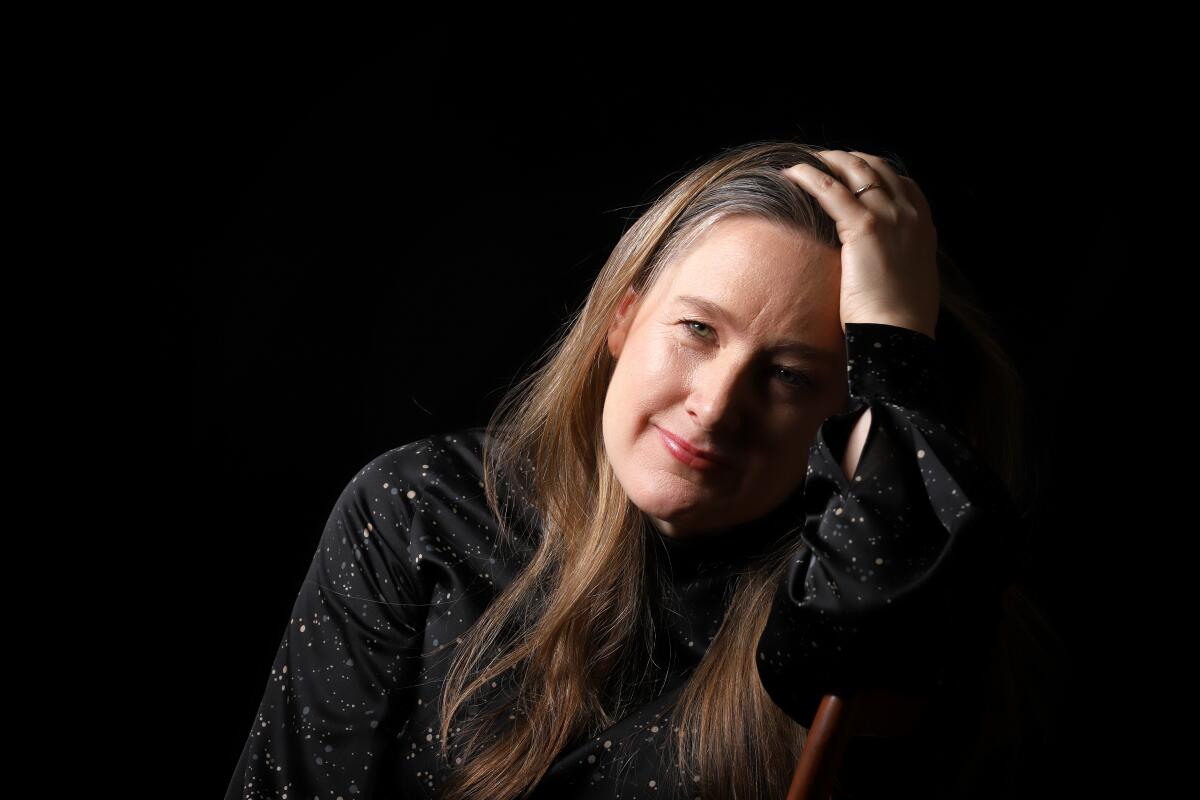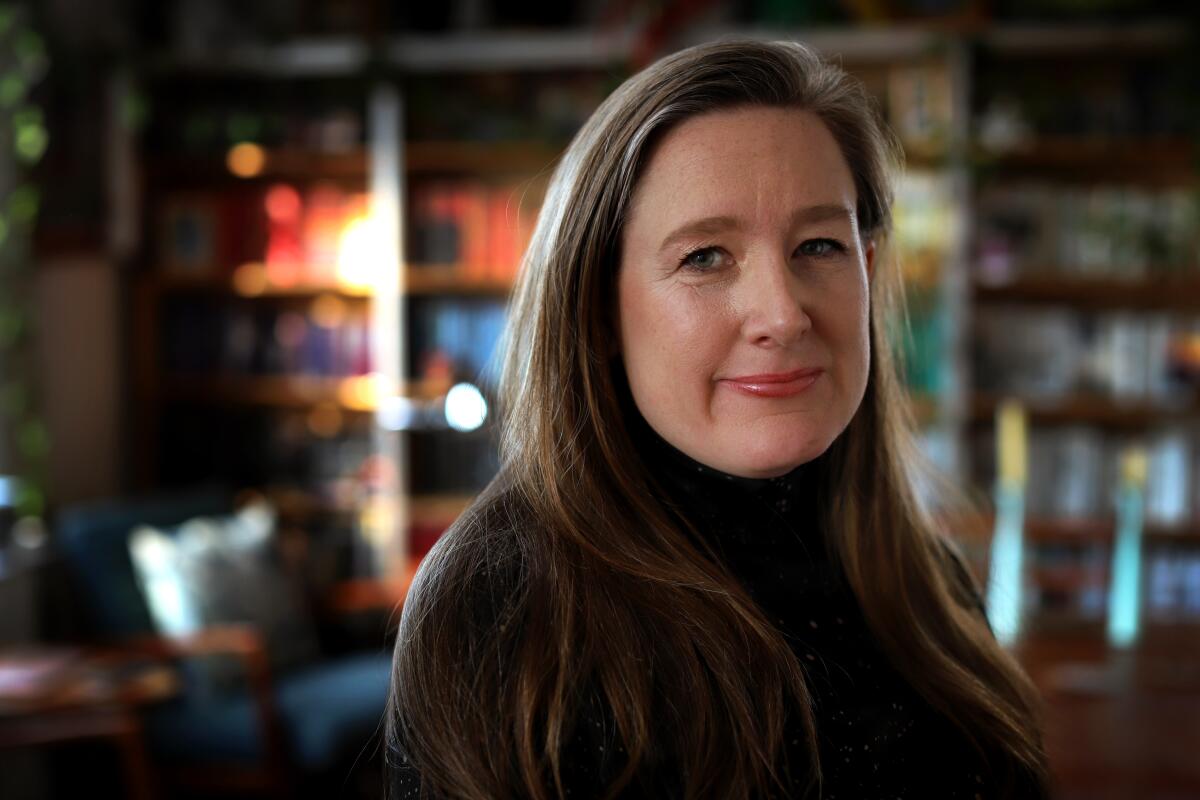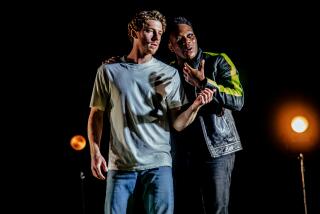Playwright Sarah Ruhl is back, breathing more life into ‘Eurydice’ for L.A. Opera

There’s something about “Eurydice.”
Sarah Ruhl’s 2003 lyrical drama comes around almost as often as revivals of “Hamlet” in this town. Circle X Theatre Co. introduced the play to L.A. audiences in 2006. Since then, productions at the Hayworth Theatre, South Coast Repertory, A Noise Within and City Garage have notably taken their shots at this buoyant reworking of the Orpheus and Eurydice myth.
Now Los Angeles Opera, in a co-production with New York’s Metropolitan Opera, has brought about a metamorphosis worthy of Ovid: Ruhl’s play has been transformed into an opera, composed by 29-year-old wunderkind Matthew Aucoin and directed by Mary Zimmerman, who aptly enough won a Tony for her staging of Ovid’s “Metamorphoses.”
While in L.A. for rehearsals, Ruhl spoke about the curious hold “Eurydice” has on audiences. She couldn’t say for sure whether it was her most produced play, but she proposed a reason for its popularity with young people.
“There are no swear words in it, so it’s done by high schools a lot,” she said with a brush of impish laughter. “It’s done in Texas, in competitions and in places that other of my plays couldn’t be done.”
Typical Ruhl. Just when you expect gravity, she offers ironic lightness. “Eurydice,” which retells the story of a young couple, Orpheus and Eurydice, separated by death on their wedding day, was written partly in response to Ruhl’s lingering grief over the death of her father. Her play grapples with the difficulty of comprehending profound loss.
But the writing is frolicsome even when Eurydice finds herself stumbling about the underworld. A spry theatrical imagination conjures a chorus of talking stones as this newly dead young bride learns to communicate again with her dead father and tentatively reunites with her musician husband, Orpheus, who is granted the chance to escort his beloved back to the land of the living if he can resist checking to see if she’s still behind him on the harrowing journey home.
In her sprightly collection “100 Essays I Don’t Have Time to Write,” Ruhl has a brief meditation on a piece of writing by Italo Calvino, in which she makes the observation that “lightness is a philosophical choice to temper reality with strangeness, to temper the intellect with emotion, and to temper emotion with humor.” These words apply as much to her own work as they do to the Italian writer who inspired them.
Ruhl, who lives in Brooklyn, N.Y., with her psychiatrist husband and three children, was having a cup of English breakfast tea at one of the outdoor tables overlooking the fountain at the Music Center. A playwright with surrealistic wit, she quipped as I neurotically rechecked my digital recorder at the start of the interview, “Wouldn’t it be funny if all you got was the sound of the fountain?”
As will be clear to anyone who has seen “The Clean House,” which catapulted her national reputation, or “In the Next Room or the Vibrator Play,” which made it to Broadway despite (or perhaps because of) its title, this off-the-cuff remark crystallizes her loopy sensibility. Ruhl’s imagination operates in the subjunctive realm. Her plays are launched by fanciful “what ifs.” The whimsical nature of her writing can be risky — theatergoers (and critics) aren’t always willing to go along for the ride — but the emotional rewards can be unexpectedly rich.
“Eurydice” is a relatively early play in Ruhl’s already substantial oeuvre. She started the play as a graduate student in playwriting at Brown University, where she also did her undergraduate work. Paula Vogel, her mentor at Brown, persuaded Ruhl, an Illinois native from the Chicago area who had set her mind on becoming a poet, to consider the path of dramatic poetry.
“Of all my plays, ‘Eurydice’ is the closest to poetry, where I started,” she said. “It’s almost a bridge between when I started writing poetry and when I started writing plays.”

Of all my plays, ‘Eurydice’ is the closest to poetry, where I started.
— Sarah Ruhl
The lyricism of the work has made the adaptation seem natural. “There was less transformation needed than you would think to vault it into song,” Ruhl said. “The play is written in three movements. Even the way it’s laid out on the page, there’s a kind of musical notation.”
For Ruhl, who speaks softly yet deliberately, with an unassuming Midwestern air, “Eurydice” is imbued with a personal sorrow. “My father died when I was 20,” she said. “He was diagnosed with cancer when I was 18. And I was deeply close with him. So when I sat down to write this when I was about 26, which, ironically, is the age Matt Aucoin was when he started the opera, it made sense to me that if Eurydice went to the underworld she would meet her father. She wanted to have more conversations with him the way I wanted to have more conversations with my father.”
Is it difficult to return to a play that carries the memory of such a loss?
“It’s fascinating grief and repetition — how many times you can repeat a grief until you think you’re done, but you’re not done,” Ruhl said. “I remember the first time I heard a reading. It was at New Dramatists in New York, and I just wept in the bathroom afterward and didn’t want to talk to anyone. I felt so exposed and vulnerable, and then I repeated the grief and repeated it until it was for other people. By the time I began collaborating with Matt, I felt I was ready to give the story away. I was ready to excavate it in a different way. But I was just at rehearsal this morning, and hearing the father sing one of his arias made me weep as though I’m 25 again.”
For the most part, the experience has been joyful. Ruhl, a recipient of the MacArthur Fellowship and a teacher of playwriting at the Yale School of Drama, described her collaboration with Aucoin as “bizarrely seamless.” Preparing the text has been a process of “distillation, musicalizing some phrasings and versifying some lines.”
“Matt and I went back and forth very closely on the libretto,” she said. “He has a house in Vermont, where he composes, and he’d call me from a field, where I could hear the wind blowing. I’d answer his question, and then he’d go write and send me what he did. And I’d say, ‘Beautiful.’ It wasn’t arduous.”
Aucoin doesn’t follow the play’s wedding day musical suggestions. Eurydice’s father no longer does the jitterbug in the underworld, and the song “Don’t Sit Under the Apple Tree” that Orpheus and Eurydice sing has been replaced by Ruhl with a blessing she gave at the wedding for an exceptionally talented former student of hers named Max Ritvo, who got married before he died of cancer. (The blessing is published in “Letters From Max: A Book of Friendship,” the collection Ruhl collaborated on with Ritvo and completed after his death.)
For the wedding, Aucoin has composed dance music that Ruhl described as having “strains of weird ’80s synth rock but orchestral.” “I find it deeply hilarious,” she said approvingly. “One thing I love about Matt is that he’s so porous and versatile and virtuosic, and so he can pull from unexpected places.”
Ruhl is accustomed to working closely with her directors on premieres of her work. She’s been less hands-on for the L.A. Opera production, but her connection with Zimmerman has ensured a high level of trust.
“Mary has very clear ideas of how she works with designers, and so I was less involved in that process,” she said. “But I feel very close to all the designers. They’re all Chicago folks. I’ve worked with [scenic designer] Dan Ostling before, and I’ve watched Mary’s work for years. She was very influential for me when I was 17, 18, 19, growing up in Chicago and seeing her work. She felt like exactly the right person to do this.”
Ruhl chided herself for not having yet seen “Hadestown,” Anaïs Mitchell’s Tony-winning musical reworking of the Orpheus and Eurydice story that was sensationally directed by Rachel Chavkin. But she understands the myth’s allure for contemporary audiences.
“It always has and always will have deep archetypal significance,” she said. “It’s a love story that has to do with faith and faithlessness. The opacity of that gesture when Orpheus turns and loses Eurydice just keeps needing to be reinterpreted.”
Ruhl was inspired by Rainer Maria Rilke’s poem “Orpheus. Eurydice. Hermes.” “It’s one of the only poems written by a man on the subject where the subjectivity of Eurydice gets teased out,” she said. “I think for women, like Rachel Chavkin, to be now looking at the myth, there’s a new entry point. But people always look at it.”
Time has shifted her own perspective. “I was just with my children swimming recently in the ocean,” she said. “My children are still kind of small, and I kept looking back to make sure they were there. Why shouldn’t Orpheus look back? Why shouldn’t he make sure she’s there? As a mother, I have different feelings about the myth than when I was 26 and wrote the play.”
She also has different feelings about her career, now that she’s no longer the bright new star on the playwriting scene but an established artist, who is mentoring the next generation. Championed early on by the New York Times’ Charles Isherwood and the New Yorker’s John Lahr, Ruhl said her “fortunes in term of reviews” have somewhat “dwindled” of late.
Midcareer, as the trajectories of Edward Albee and countless other original dramatists illustrate, isn’t the easiest place for a playwright to be. “I think it has to do with America’s preoccupation with the new,” she said. “And when you add womanhood to it, there’s an extra valence. I’m not as fatalistic as John Lahr, who determined the number of years — I can’t remember if it was 11 or 17 — in which a playwright is culturally relevant. But things do go in cycles. We make room for the new, and the conversation changes. One thing that makes me feel hopeful is teaching, because I watch these amazing writers come up.”
Ruhl thinks of her plays as gifts to put out into the world unburdened by expectations, an attitude that has helped her weather the vicissitudes of the critical marketplace. “Eurydice” is dedicated to her late father and she wrote the more recent “For Peter Pan on Her 70th Birthday” for her mother, an actress who starred in the work’s Chicago premiere.
As happily industrious as ever, Ruhl has a book of poetry coming out in February. She has been developing a musical with Elvis Costello. She gives herself fully to her students while balancing family and her own writing, which includes adaptations of such classic works as Chekhov’s “Three Sisters” and Virginia Woolf’s “Orlando.” Oh, and if that’s not enough, she’s been working with theater colleagues on the launch of a website to expand and diversify theater criticism.
Lest we forget, Ruhl also has her opera debut Feb 1. “Eurydice,” which stars Danielle de Niese in the title role, has created so much excitement it has spawned the Eurydice Found festival, which includes a reading of the play at the Getty Villa.
“I’m gobsmacked,” Ruhl said. “l lived in L.A. when I was in my late 20s. My husband now was studying at UCLA to be a doctor, and I was so lonely and had no money. No one was doing my plays. I couldn’t even get into a writers’ group at the Taper because you had to be under commission. I was in a spiritual wasteland. And now to come back — oh, my God, there’s a Eurydice festival! So, for me, it’s a little bit like a fairy tale feeling to come back.”
L.A. Opera's 'Eurydice'
Where: Dorothy Chandler Pavilion, 135 N. Grand Ave., L.A.
When: 7:30 p.m. Feb. 1, 8, 14 and 20; 2 p.m. Feb. 16 and 23
Tickets: $15-$289 (subject to change)
Info: (213) 972-8001, LAOpera.org
More to Read
The biggest entertainment stories
Get our big stories about Hollywood, film, television, music, arts, culture and more right in your inbox as soon as they publish.
You may occasionally receive promotional content from the Los Angeles Times.











